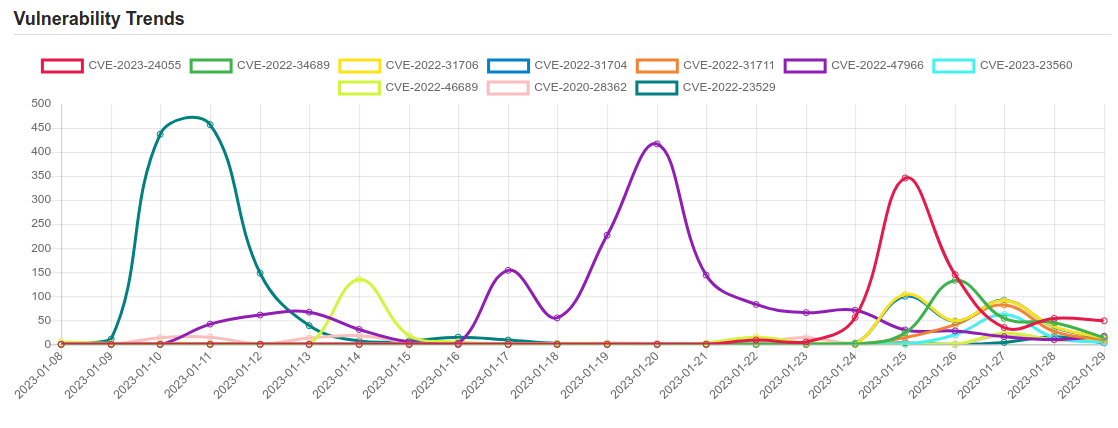Daily Vulnerability Trends: Mon Jan 30 2023


| CVE NAME | CVE Description |
| CVE-2020-28362 | Go before 1.14.12 and 1.15.x before 1.15.4 allows Denial of Service. |
| CVE-2022-23529 | ** REJECT ** DO NOT USE THIS CANDIDATE NUMBER. ConsultIDs: none. Reason: The issue is not a vulnerability. Notes: none. |
| CVE-2022-34718 | Windows TCP/IP Remote Code Execution Vulnerability. |
| CVE-2022-45770 | Improper input validation in driver adgnetworkwfpdrv.sys in Adguard For Windows x86 up to version 7.11 allows attacker to gain local privileges escalation. |
| CVE-2023-23504 | No description provided |
| CVE-2022-1388 | On F5 BIG-IP 16.1.x versions prior to 16.1.2.2, 15.1.x versions prior to 15.1.5.1, 14.1.x versions prior to 14.1.4.6, 13.1.x versions prior to 13.1.5, and all 12.1.x and 11.6.x versions, undisclosed requests may bypass iControl REST authentication. Note: Software versions which have reached End of Technical Support (EoTS) are not evaluated |
| CVE-2023-0297 | Code Injection in GitHub repository pyload/pyload prior to 0.5.0b3.dev31. |
| CVE-2022-21225 | Improper neutralization in the Intel(R) Data Center Manager software before version 4.1 may allow an authenticated user to potentially enable escalation of privilege via adjacent access. |
| CVE-2023-0560 | A vulnerability, which was classified as critical, has been found in SourceCodester Online Tours & Travels Management System 1.0. This issue affects some unknown processing of the file admin/practice_pdf.php. The manipulation of the argument id leads to sql injection. The attack may be initiated remotely. The exploit has been disclosed to the public and may be used. The identifier VDB-219701 was assigned to this vulnerability. |
| CVE-2022-3094 | Sending a flood of dynamic DNS updates may cause `named` to allocate large amounts of memory. This, in turn, may cause `named` to exit due to a lack of free memory. We are not aware of any cases where this has been exploited. Memory is allocated prior to the checking of access permissions (ACLs) and is retained during the processing of a dynamic update from a client whose access credentials are accepted. Memory allocated to clients that are not permitted to send updates is released immediately upon rejection. The scope of this vulnerability is limited therefore to trusted clients who are permitted to make dynamic zone changes. If a dynamic update is REFUSED, memory will be released again very quickly. Therefore it is only likely to be possible to degrade or stop `named` by sending a flood of unaccepted dynamic updates comparable in magnitude to a query flood intended to achieve the same detrimental outcome. BIND 9.11 and earlier branches are also affected, but through exhaustion of internal resources rather than memory constraints. This may reduce performance but should not be a significant problem for most servers. Therefore we don’t intend to address this for BIND versions prior to BIND 9.16. This issue affects BIND 9 versions 9.16.0 through 9.16.36, 9.18.0 through 9.18.10, 9.19.0 through 9.19.8, and 9.16.8-S1 through 9.16.36-S1. |
| CVE-2022-33942 | Protection mechanism failure in the Intel(R) DCM software before version 5.0 may allow an unauthenticated user to potentially enable escalation of privilege via adjacent access. |
| CVE-2023-0561 | A vulnerability, which was classified as critical, was found in SourceCodester Online Tours & Travels Management System 1.0. Affected is an unknown function of the file /user/s.php. The manipulation of the argument id leads to sql injection. It is possible to launch the attack remotely. The exploit has been disclosed to the public and may be used. VDB-219702 is the identifier assigned to this vulnerability. |
| CVE-2023-24055 | ** DISPUTED ** KeePass through 2.53 (in a default installation) allows an attacker, who has write access to the XML configuration file, to obtain the cleartext passwords by adding an export trigger. NOTE: the vendor’s position is that the password database is not intended to be secure against an attacker who has that level of access to the local PC. |
| CVE-2022-34689 | Windows CryptoAPI Spoofing Vulnerability. |
| CVE-2022-31706 | The vRealize Log Insight contains a Directory Traversal Vulnerability. An unauthenticated, malicious actor can inject files into the operating system of an impacted appliance which can result in remote code execution. |
A considerable amount of time and effort goes into maintaining this website, creating backend automation and creating new features and content for you to make actionable intelligence decisions. Everyone that supports the site helps enable new functionality.
If you like the site, please support us on Patreon using the button below
To keep up to date follow us on the below channels.








![Black Basta Ransomware Victim: fluenthome[.]com 12 Basta](https://www.redpacketsecurity.com/wp-content/uploads/2022/06/Basta-300x97.png)